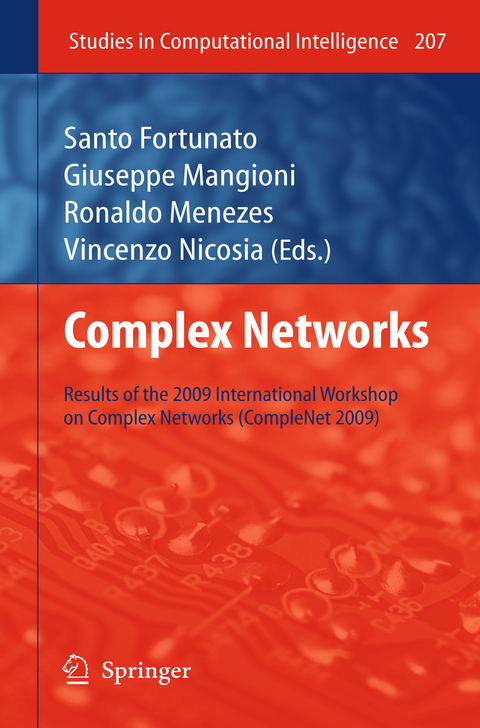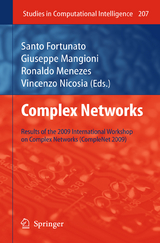Complex Networks
Springer Berlin (Verlag)
978-3-642-01205-1 (ISBN)
Though the reductionist approachto biology and medicine has led to several imp- tant advances, further progresses with respect to the remaining challenges require integration of representation, characterization and modeling of the studied systems along a wide range of spatial and time scales. Such an approach, intrinsically - lated to systems biology, is poised to ultimately turning biology into a more precise and synthetic discipline, paving the way to extensive preventive and regenerative medicine [1], drug discovery [20] and treatment optimization [24]. A particularly appealing and effective approach to addressing the complexity of interactions inherent to the biological systems is provided by the new area of c- plex networks [34, 30, 8, 13, 12]. Basically, it is an extension of graph theory [10], focusing on the modeling, representation, characterization, analysis and simulation ofcomplexsystemsbyconsideringmanyelementsandtheirinterconnections.C- plex networks concepts and methods have been used to study disease [17], tr- scription networks [5, 6, 4], protein-protein networks [22, 36, 16, 39], metabolic networks [23] and anatomy [40].
Session 1: Analysis of Real Networks.- Dynamics and Evolution of the International Trade Network.- Small World Behavior of the Planetary Active Volcanoes Network: Preliminary Results.- Correlation Patterns in Gene Expressions along the Cell Cycle of Yeast.- Session 2: Community Structure.- Detecting and Characterizing the Modular Structure of the Yeast Transcription Network.- Finding Overlapping Communities Using Disjoint Community Detection Algorithms.- Discovering Community Structure on Large Networks Using a Grid Computing Environment.- Finding Community Structure Based on Subgraph Similarity.- Session 3: Network Modeling.- Structural Trends in Network Ensembles.- Generalized Attachment Models for the Genesis of Graphs with High Clustering Coefficient.- Modeling Highway Networks with Path-Geographical Transformations.- Session 4: Network Dynamics.- Simplicial Complex of Opinions on Scale-Free Networks.- An Axiomatic Foundation for Epidemics on Complex Networks.- Analytical Approach to Bond Percolation on Clustered Networks.- Session 5: Applications.- Order-Wise Correlation Dynamics in Text Data.- Using Time Dependent Link Reduction to Improve the Efficiency of Topic Prediction in Co-Authorship Graphs.- Fast Similarity Search in Small-World Networks.- Detection of Packet Traffic Anomalous Behaviour via Information Entropy.- Identification of Social Tension in Organizational Networks.
| Erscheint lt. Verlag | 11.8.2009 |
|---|---|
| Reihe/Serie | Studies in Computational Intelligence |
| Zusatzinfo | XVII, 225 p. |
| Verlagsort | Berlin |
| Sprache | englisch |
| Maße | 155 x 235 mm |
| Gewicht | 1150 g |
| Themenwelt | Informatik ► Theorie / Studium ► Algorithmen |
| Mathematik / Informatik ► Mathematik ► Wahrscheinlichkeit / Kombinatorik | |
| Technik | |
| Schlagworte | Algorithm analysis and problem complexity • Artificial Intelligence • Complexity • complex networks • Complex Systems • Computational Intelligence • Cyc • Distributed Systems • Evolution • Hardcover, Softcover / Technik/Allgemeines, Lexika • Modeling • Racter |
| ISBN-10 | 3-642-01205-1 / 3642012051 |
| ISBN-13 | 978-3-642-01205-1 / 9783642012051 |
| Zustand | Neuware |
| Informationen gemäß Produktsicherheitsverordnung (GPSR) | |
| Haben Sie eine Frage zum Produkt? |
aus dem Bereich




